21 oct 2019
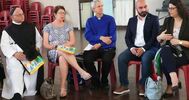
There is a possibility that there will be no indigenous Christians left in the Holy Land - unless Israel ends its occupation of Palestine. This was the urgent message from Palestinian Christian theologians and activists speaking at the Holy Land Conference in Johannesburg last week.
Hosted by The Evangelical Alliance of South Africa (TEASA), which represents almost 4 million Christians who identify as born-again or evangelical, delegates heard first-hand accounts of how Israel’s military occupation and its restrictions on Palestinian movement prevented Christian Palestinians from worshiping at Christianity’s most sacred sites in occupied Jerusalem. Some of these sites are located less than 15km from their homes. Israel’s occupation of Palestine has also effectively deprived Palestinians of access to education, health-care and employment opportunities.
This has led to an exodus of Christian Palestinians from the occupied West Bank, East Jerusalem and Gaza Strip. Indigenous Christian Palestinians once constituted over 19% of Palestine’s population, and number less than 2 percent today.
According to Shireen Awwad Hilal, the coordinator of Musalaha Women’s Ministry in Bethlehem, the chief cause of the decline in the Christian population of the Holy Land is not due to the persecution of Christians by Muslims. “Many Christians feel that there is little hope for a better future for their children under Israeli occupation, and this has contributed to the growing emigration of Palestinian Christians. Christian Palestinians are under threat from the Israeli occupation – not Islam,” says Awwad Hilal.
Yousef Al-Khouri agrees. “Muslim and Christian Palestinians suffer equally under the Israeli occupation. There is no conflict between Islam and Christianity in Gaza or anywhere else in occupied Palestine. This is not a religious conflict, this is occupation,” says the Gaza-born Biblical Studies lecturer whose family goes back over 900 years in the Greek Orthodox priesthood in Palestine.
According to TEASA secretary-general, Reverend Moss Nthla, the conference and the visit by the Palestinians was a ground-breaking attempt by the evangelical movement in South Africa to introduce an alternative narrative on the Holy Land. The dominant narrative within the evangelical movement is that the creation of the state of Israel was a fulfillment of Biblical prophecy. This narrative, Nthla says, “weaponizes the Bible against Palestinians and justifies the occupation of Palestine.”
“As Christians, we need to change our role as unwitting collaborators with the oppression of Palestinian people. We must inform and equip ourselves to be part of a solution that has as its aim a just peace in Palestine, rather than being part of the problem,” Nthla explained in an interview with the Afro-Palestine Newswire Service. “South African Christians must be interested in what is happening in Israel/Palestine because it is the place where Jesus Christ was born, lived and died.”
The South African Council of Churches (SACC) has condemned Israel’s occupation of Palestine, calling the treatment of the Palestinians by Israel “worse than Apartheid”.
In September, the Anglican and Methodist Churches of Southern Africa resolved to support the Boycott, Divestment and Sanctions (BDS) campaign against Israel until that state ended its military occupation of Palestine.
Hosted by The Evangelical Alliance of South Africa (TEASA), which represents almost 4 million Christians who identify as born-again or evangelical, delegates heard first-hand accounts of how Israel’s military occupation and its restrictions on Palestinian movement prevented Christian Palestinians from worshiping at Christianity’s most sacred sites in occupied Jerusalem. Some of these sites are located less than 15km from their homes. Israel’s occupation of Palestine has also effectively deprived Palestinians of access to education, health-care and employment opportunities.
This has led to an exodus of Christian Palestinians from the occupied West Bank, East Jerusalem and Gaza Strip. Indigenous Christian Palestinians once constituted over 19% of Palestine’s population, and number less than 2 percent today.
According to Shireen Awwad Hilal, the coordinator of Musalaha Women’s Ministry in Bethlehem, the chief cause of the decline in the Christian population of the Holy Land is not due to the persecution of Christians by Muslims. “Many Christians feel that there is little hope for a better future for their children under Israeli occupation, and this has contributed to the growing emigration of Palestinian Christians. Christian Palestinians are under threat from the Israeli occupation – not Islam,” says Awwad Hilal.
Yousef Al-Khouri agrees. “Muslim and Christian Palestinians suffer equally under the Israeli occupation. There is no conflict between Islam and Christianity in Gaza or anywhere else in occupied Palestine. This is not a religious conflict, this is occupation,” says the Gaza-born Biblical Studies lecturer whose family goes back over 900 years in the Greek Orthodox priesthood in Palestine.
According to TEASA secretary-general, Reverend Moss Nthla, the conference and the visit by the Palestinians was a ground-breaking attempt by the evangelical movement in South Africa to introduce an alternative narrative on the Holy Land. The dominant narrative within the evangelical movement is that the creation of the state of Israel was a fulfillment of Biblical prophecy. This narrative, Nthla says, “weaponizes the Bible against Palestinians and justifies the occupation of Palestine.”
“As Christians, we need to change our role as unwitting collaborators with the oppression of Palestinian people. We must inform and equip ourselves to be part of a solution that has as its aim a just peace in Palestine, rather than being part of the problem,” Nthla explained in an interview with the Afro-Palestine Newswire Service. “South African Christians must be interested in what is happening in Israel/Palestine because it is the place where Jesus Christ was born, lived and died.”
The South African Council of Churches (SACC) has condemned Israel’s occupation of Palestine, calling the treatment of the Palestinians by Israel “worse than Apartheid”.
In September, the Anglican and Methodist Churches of Southern Africa resolved to support the Boycott, Divestment and Sanctions (BDS) campaign against Israel until that state ended its military occupation of Palestine.
2 oct 2019
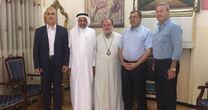
A delegation from the Hamas Movement on Tuesday visited the Church of Saint Porphyrius in the Gaza Strip and met with its officials.
Gaza's Greek Orthodox Archbishop Alexios and Issa Tarazi, head of the Near East Council of Churches committee for refugee work in Gaza, received the delegation, which included senior Hamas officials Basem Na’im, Maher al-Houli and Fawzi Barhoum.
According to Basem Na’im, the visit came within the framework of promoting good relations and values of love, friendship and coexistence among all citizens.
In press remarks during the meeting, Na’im affirmed his Movement’s keenness on strengthening ties with the Palestinian people from all spectra and sects.
He stressed that the Palestinian people, Muslims or Christians, would remain steadfast on their land defending their right to live with dignity and freedom.
For his part, Archbishop Alexios expressed his appreciation to the Hamas officials for their visit, describing Gaza as “an example of coexistence and national partnership between Muslims and Christians.”
“We do not feel that we are targeted at all as Christians; on the contrary, we find all the love, appreciation and respect from the Hamas Movement and great care from its leadership as well as every cooperation and concern from all government authorities regarding any difficulties or challenges we could face,” the Archbishop said.
“The Christians are part of this Palestinian people and we will continue to work on strengthening and developing this relationship to ensure preservation of this great legacy, which has been established by the generations over the past hundreds of years, and we will never allow anyone to spoil this relationship or poison the good atmosphere between us,” he added.
Gaza's Greek Orthodox Archbishop Alexios and Issa Tarazi, head of the Near East Council of Churches committee for refugee work in Gaza, received the delegation, which included senior Hamas officials Basem Na’im, Maher al-Houli and Fawzi Barhoum.
According to Basem Na’im, the visit came within the framework of promoting good relations and values of love, friendship and coexistence among all citizens.
In press remarks during the meeting, Na’im affirmed his Movement’s keenness on strengthening ties with the Palestinian people from all spectra and sects.
He stressed that the Palestinian people, Muslims or Christians, would remain steadfast on their land defending their right to live with dignity and freedom.
For his part, Archbishop Alexios expressed his appreciation to the Hamas officials for their visit, describing Gaza as “an example of coexistence and national partnership between Muslims and Christians.”
“We do not feel that we are targeted at all as Christians; on the contrary, we find all the love, appreciation and respect from the Hamas Movement and great care from its leadership as well as every cooperation and concern from all government authorities regarding any difficulties or challenges we could face,” the Archbishop said.
“The Christians are part of this Palestinian people and we will continue to work on strengthening and developing this relationship to ensure preservation of this great legacy, which has been established by the generations over the past hundreds of years, and we will never allow anyone to spoil this relationship or poison the good atmosphere between us,” he added.
27 sept 2019
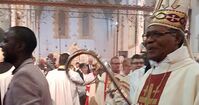
The highest decision-making body of the Anglican Church of Southern Africa (ACSA) on Thursday unanimously resolved to support the Boycott, Divestment and Sanctions (BDS) campaign against Israel until that state ended its military occupation of Palestine.
The resolution was passed in Johannesburg at the Church’s Provincial Synod, which takes place every three years and represents Anglican communities in South Africa as well as Namibia, Lesotho, Eswatini (Swaziland), Mozambique, Angola and St Helena.
According to the resolution, “the situation in the Holy Land demands the attention of the Christian Church precisely because that is the place where Jesus Christ was born, nurtured, crucified and raised.”
The resolution also cautions against conflating the current nation-state of Israel with Biblical Israel. A differentiation was also made between the political ideology of Zionism and the religion of Judaism.
Condemning anti-Semitism and Islamophobia in the strongest terms, the ACSA resolution also acknowledged that there were similarities between Apartheid South Africa and what is happening in occupied Palestine and that in some respects the situation there can be described as worse than Apartheid. It is for this reason, the resolution notes that “Southern Africans have a special responsibility to stand by the oppressed in the same way that others in the international community stood with us during our own oppression.”
According to the Anglican Bishop of Namibia, Luke Pato, the resolution was introduced at the Synod to develop practical ways of ending the occupation. “It is the right time, it is God’s time for the occupation to end and for Palestinians to be liberated,” Pato told the Afro-Palestine Newswire Service.
Pato - who seconded the resolution - explained that the resolution was a continuation of the Anglican Church’s long-standing support of the Palestinian liberation struggle, when Archbishop Desmond Tutu first led a delegation to the Occupied Palestinian Territories (OPT) in the 1980's.
Southern African delegates will also request that the Anglican Communion Office in the United Kingdom consider a similar resolution for inclusion on the agenda of the Lambeth 2020 Conference, which next year brings together active Anglican bishops from 165 countries worldwide.
The resolution also encourages every diocese within the Anglican Church to pass a similar resolution at their next Synod and to work with the South African Council of Churches to achieve justice for the Palestinians.
Palestinians have welcomed the passing of the resolution.
“Palestinians simply want to achieve peace, freedom, justice and dignity, and this resolution is an important step in forcing Israel to comply with international law and end its illegal occupation of Palestine,” Palestinian ambassador to South Africa, Hashem Dajani, told the Afro-Palestine Newswire Service. Dajani hoped that other denominations and groups would replicate the Anglican Church resolution.
Speaking from the besieged Gaza Strip, Hamas spokesperson, Basem Naim, said that the resolution was an important show of solidarity with the Palestinian people and their cause and “encourages us to continue our struggle against the occupation.”
The resolution was passed in Johannesburg at the Church’s Provincial Synod, which takes place every three years and represents Anglican communities in South Africa as well as Namibia, Lesotho, Eswatini (Swaziland), Mozambique, Angola and St Helena.
According to the resolution, “the situation in the Holy Land demands the attention of the Christian Church precisely because that is the place where Jesus Christ was born, nurtured, crucified and raised.”
The resolution also cautions against conflating the current nation-state of Israel with Biblical Israel. A differentiation was also made between the political ideology of Zionism and the religion of Judaism.
Condemning anti-Semitism and Islamophobia in the strongest terms, the ACSA resolution also acknowledged that there were similarities between Apartheid South Africa and what is happening in occupied Palestine and that in some respects the situation there can be described as worse than Apartheid. It is for this reason, the resolution notes that “Southern Africans have a special responsibility to stand by the oppressed in the same way that others in the international community stood with us during our own oppression.”
According to the Anglican Bishop of Namibia, Luke Pato, the resolution was introduced at the Synod to develop practical ways of ending the occupation. “It is the right time, it is God’s time for the occupation to end and for Palestinians to be liberated,” Pato told the Afro-Palestine Newswire Service.
Pato - who seconded the resolution - explained that the resolution was a continuation of the Anglican Church’s long-standing support of the Palestinian liberation struggle, when Archbishop Desmond Tutu first led a delegation to the Occupied Palestinian Territories (OPT) in the 1980's.
Southern African delegates will also request that the Anglican Communion Office in the United Kingdom consider a similar resolution for inclusion on the agenda of the Lambeth 2020 Conference, which next year brings together active Anglican bishops from 165 countries worldwide.
The resolution also encourages every diocese within the Anglican Church to pass a similar resolution at their next Synod and to work with the South African Council of Churches to achieve justice for the Palestinians.
Palestinians have welcomed the passing of the resolution.
“Palestinians simply want to achieve peace, freedom, justice and dignity, and this resolution is an important step in forcing Israel to comply with international law and end its illegal occupation of Palestine,” Palestinian ambassador to South Africa, Hashem Dajani, told the Afro-Palestine Newswire Service. Dajani hoped that other denominations and groups would replicate the Anglican Church resolution.
Speaking from the besieged Gaza Strip, Hamas spokesperson, Basem Naim, said that the resolution was an important show of solidarity with the Palestinian people and their cause and “encourages us to continue our struggle against the occupation.”
16 sept 2019
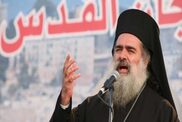
Bishop Atallah Hanna, the archbishop of Sebastian Roman Orthodox, stated Saturday, that the ancient Orthodox real estate in the area of Hebron Gate is under serious threat, and that extremist Jewish settlers may seize these properties at any time.
The archbishop issued the following statements while being hosted by a delegation from the Orthodox parish, from Jerusalem and vicinity.
“We might witness the same scenario of the building of Saint John the Beloved in the Old City, to which the settlers were allowed years ago, again here in Hebron Gate.”
“This is a new and renewed calamity targeting our ancient Orthodox estates in Jerusalem. The seizure of Hebron Gate and its buildings means further weakening, and marginalizing Christian presence in Jerusalem,” he declared.
Bishop Atallah Hanna:“We call on the churches over the world and on the human rights institutions to stand up for the salvation of orthodox real estate in Hebron from the clutches of extremist settlers.”
He added:“We have been addressing appealing letters to the rest of the world over the past months, calling for a move to stop this impending catastrophe threatening us in Hebron, but we have not yet seen any serious action or any initiatives aimed to break this deal, concluded by the unworthy and submitted to the unworthy. ”
Bishop Atallah explained “those allowing these takeovers are betraying the Church and Jerusalem, and are no better than Judas Iscariot, who betrayed his teacher for 30 silver coins. Unfortunately, others betraying their teachers and Christianity for some dollars still exist, and they are becoming tools serving the enemies of Jerusalem, its sanctities and holy, Islamic and Christian endowments.”
“We shall warn again against the danger of the schemes targeting Hebron, for the news reported by media foreshadows the impending disaster. Settlers may storm the ancient Hebron buildings at any time. We may wake up one day to find the settlers in these buildings with the Israeli flag raised on top of them,” he warned.
“We shall reiterate our call to King Abdullah II bin Al-Hussein, the Hashemite custodian of Jerusalem and its Islamic and Christian holy sites, as well as the Palestinian president, Abu Mazen, to work to break this deal and preserve the identity and history of Jerusalem, and the Christian presence in this blessed city.
We shall also address all world leaders, Islamic and Christian religious authorities and advocates of justice and human rights around the world, urging them to stop this impending catastrophe threatening Hebron and its ancient Orthodox buildings, the leading gate to the holy sites, monasteries, churches and ancient patriarchates in Jerusalem.”
The Bishop pointed out that “breaking the Hebron deal needs a legal and political effort because this issue is political, being part of the deal of the century and conspiring against Jerusalem, its holy sites and Arab-Palestinian identity. Politicians are quite aware of the moves they should be taking in order to break this deal, in case they are willing to.”
“Take action before it is too late. Do not let Jerusalem bleed alone, its endowments stolen and sanctities targeted. Move before it is too late. Our Christian presence in Jerusalem has become endangered. Targeting us, our holy sites and endowments is targeting all Jerusalem without exception.”
Source: Palestine Chronicle/Middle East Monitor
The archbishop issued the following statements while being hosted by a delegation from the Orthodox parish, from Jerusalem and vicinity.
“We might witness the same scenario of the building of Saint John the Beloved in the Old City, to which the settlers were allowed years ago, again here in Hebron Gate.”
“This is a new and renewed calamity targeting our ancient Orthodox estates in Jerusalem. The seizure of Hebron Gate and its buildings means further weakening, and marginalizing Christian presence in Jerusalem,” he declared.
Bishop Atallah Hanna:“We call on the churches over the world and on the human rights institutions to stand up for the salvation of orthodox real estate in Hebron from the clutches of extremist settlers.”
He added:“We have been addressing appealing letters to the rest of the world over the past months, calling for a move to stop this impending catastrophe threatening us in Hebron, but we have not yet seen any serious action or any initiatives aimed to break this deal, concluded by the unworthy and submitted to the unworthy. ”
Bishop Atallah explained “those allowing these takeovers are betraying the Church and Jerusalem, and are no better than Judas Iscariot, who betrayed his teacher for 30 silver coins. Unfortunately, others betraying their teachers and Christianity for some dollars still exist, and they are becoming tools serving the enemies of Jerusalem, its sanctities and holy, Islamic and Christian endowments.”
“We shall warn again against the danger of the schemes targeting Hebron, for the news reported by media foreshadows the impending disaster. Settlers may storm the ancient Hebron buildings at any time. We may wake up one day to find the settlers in these buildings with the Israeli flag raised on top of them,” he warned.
“We shall reiterate our call to King Abdullah II bin Al-Hussein, the Hashemite custodian of Jerusalem and its Islamic and Christian holy sites, as well as the Palestinian president, Abu Mazen, to work to break this deal and preserve the identity and history of Jerusalem, and the Christian presence in this blessed city.
We shall also address all world leaders, Islamic and Christian religious authorities and advocates of justice and human rights around the world, urging them to stop this impending catastrophe threatening Hebron and its ancient Orthodox buildings, the leading gate to the holy sites, monasteries, churches and ancient patriarchates in Jerusalem.”
The Bishop pointed out that “breaking the Hebron deal needs a legal and political effort because this issue is political, being part of the deal of the century and conspiring against Jerusalem, its holy sites and Arab-Palestinian identity. Politicians are quite aware of the moves they should be taking in order to break this deal, in case they are willing to.”
“Take action before it is too late. Do not let Jerusalem bleed alone, its endowments stolen and sanctities targeted. Move before it is too late. Our Christian presence in Jerusalem has become endangered. Targeting us, our holy sites and endowments is targeting all Jerusalem without exception.”
Source: Palestine Chronicle/Middle East Monitor
29 aug 2019
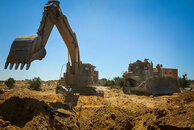
Israeli bulldozers today leveled Palestinian land in Wadi al-Makhrour, located to the west of the West Bank city of Bethlehem.
Hassan Breijeh, a local anti-wall and settlement activist, said that Israeli bulldozers started leveling Palestinian land in Wadi al-Makhrour, a step which lays the groundwork for the construction of a one-kilometer tunnel that would connect the Gush Etzion settlement bloc with Jerusalem.
Breijeh warned that dozens of dunums of Palestinian land belonging to the largely Christian community of Beit Jala to make room for the expansion of nearby Jewish-only Israeli settlements.
Wadi al-Makhrour, a valley that stretches between Battir village and Beit Jala city, is a popular hiking spot for Palestinians. It is best enjoyed during the late afternoon in the summer when the sun is about to set.
According to the online portal for Palestinian tourism, www.visitpalestine.ps, the area encompasses both natural and agricultural landscapes and is well known for its ancient terraces and stone towers called qusur, built of neatly placed rocks that used to serve as storage rooms for various crops planted in the wadi.
The area is famous for its hills replete with agricultural terraces full of olive, apricot, and fig trees. The abundance of the place is owed to the underground natural springs and also to the hard work of the landowners. Some parts of the valley are home to natural forests with remarkable tree species such as Palestine oak (Quercus calliprinos).
Israeli forces have been targeting Wadi al-Makhrour seeking to forcefully displace the indigenous Palestinian residents from their land for Jewish-only settlement expansion.
The largely Christian city of Beit Jala is flanked by Gilo and Har Gilo settlements to the north and northwest.
Hassan Breijeh, a local anti-wall and settlement activist, said that Israeli bulldozers started leveling Palestinian land in Wadi al-Makhrour, a step which lays the groundwork for the construction of a one-kilometer tunnel that would connect the Gush Etzion settlement bloc with Jerusalem.
Breijeh warned that dozens of dunums of Palestinian land belonging to the largely Christian community of Beit Jala to make room for the expansion of nearby Jewish-only Israeli settlements.
Wadi al-Makhrour, a valley that stretches between Battir village and Beit Jala city, is a popular hiking spot for Palestinians. It is best enjoyed during the late afternoon in the summer when the sun is about to set.
According to the online portal for Palestinian tourism, www.visitpalestine.ps, the area encompasses both natural and agricultural landscapes and is well known for its ancient terraces and stone towers called qusur, built of neatly placed rocks that used to serve as storage rooms for various crops planted in the wadi.
The area is famous for its hills replete with agricultural terraces full of olive, apricot, and fig trees. The abundance of the place is owed to the underground natural springs and also to the hard work of the landowners. Some parts of the valley are home to natural forests with remarkable tree species such as Palestine oak (Quercus calliprinos).
Israeli forces have been targeting Wadi al-Makhrour seeking to forcefully displace the indigenous Palestinian residents from their land for Jewish-only settlement expansion.
The largely Christian city of Beit Jala is flanked by Gilo and Har Gilo settlements to the north and northwest.
19 aug 2019
|
|
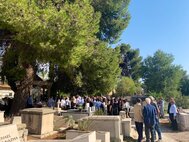
Renowned Palestinian artist Kamal Boullata buried in Jerusalem next to his family and ancestors
After decades of living in exile, renowned Palestinian artist and writer Kamal Boullata, who died in Berlin last week at age 77, finally returned to his birth town, Jerusalem, to be buried next to his family and ancestors. He was barred from living in Jerusalem, his hometown, since the start of the Israeli occupation in 1967. Boullata's family, which lives in Jerusalem, and lawyer had to fight hard to |
get an Israeli approval to bring the body of their son from Berlin to be buried in the city he was born in.
He was buried today at the cemetery of the Greek Orthodox Patriarchate of Jerusalem at Mt. Zion just outside the wall of the Old City.
Kamal was born in Jerusalem in 1942 and grew up in the Old City. His family traces its history in the Old City for over 600 years, according to the Records of the Orthodox Church of Jerusalem.
For half a century, since 1967, he was barred from Jerusalem because he happened to be out of the country, for an exhibit in Beirut in 1967 when the Israeli occupation started.
All his efforts to return to Jerusalem failed, except for a brief visit in 1984 which was memorialized in the film “Stranger at Home”. However, Jerusalem always stayed in his heart, and in his art.
"The right of every Palestinian to return to his homeland is a sacred right. It is particularly important for Jerusalemites, for whom the Holy City is part of their lives and essence.
It is sad that so many are denied this right, but it is a bitter satisfaction when someone of his stature and world-known respect is finally allowed his last wish.
May he rest in peace, and may his memory be forever," said his family in a statement.
He was buried today at the cemetery of the Greek Orthodox Patriarchate of Jerusalem at Mt. Zion just outside the wall of the Old City.
Kamal was born in Jerusalem in 1942 and grew up in the Old City. His family traces its history in the Old City for over 600 years, according to the Records of the Orthodox Church of Jerusalem.
For half a century, since 1967, he was barred from Jerusalem because he happened to be out of the country, for an exhibit in Beirut in 1967 when the Israeli occupation started.
All his efforts to return to Jerusalem failed, except for a brief visit in 1984 which was memorialized in the film “Stranger at Home”. However, Jerusalem always stayed in his heart, and in his art.
"The right of every Palestinian to return to his homeland is a sacred right. It is particularly important for Jerusalemites, for whom the Holy City is part of their lives and essence.
It is sad that so many are denied this right, but it is a bitter satisfaction when someone of his stature and world-known respect is finally allowed his last wish.
May he rest in peace, and may his memory be forever," said his family in a statement.
18 aug 2019
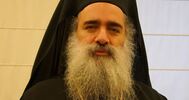
Father Atallah Hanna has said that the March of Return rallies in the Gaza Strip are aimed at declaring and affirming that the Palestinian people are adherent to their national rights and constants, especially the inalienable right of return.
“The message of the March of Return rallies is addressed to the Arab nation, friends and the world’s free people and it says that the Palestinian people will never cede their attachment to this land, and that Jerusalem is their destination, their capital and the incubator of their most important Islamic and Christian holy sites,” Hanna, the Archbishop of the Palestinian Orthodox Church in Occupied Jerusalem, told a local radio station on Saturday.
The Archbishop paid tribute to the Higher National Commission for the March of Return and Breaking the Siege for organizing such rallies and to the Palestinian citizens in Gaza for their steadfastness in the face of the Israeli blockade and aggression.
“We believe that the message sent by our people through these marches asserts their attachment to the land, identity, Jerusalem and holy sites and their rejection of the deal of the century and all suspicious projects aimed at liquidating our national cause,” Hanna said.
“From Jerusalem, we send our regards and faithfulness to the return marches, recalling the martyrs and wishing a recovery for the wounded. We also call for removing the unjust siege that has made Gaza the largest prison in the world,” he added.
“The message of the March of Return rallies is addressed to the Arab nation, friends and the world’s free people and it says that the Palestinian people will never cede their attachment to this land, and that Jerusalem is their destination, their capital and the incubator of their most important Islamic and Christian holy sites,” Hanna, the Archbishop of the Palestinian Orthodox Church in Occupied Jerusalem, told a local radio station on Saturday.
The Archbishop paid tribute to the Higher National Commission for the March of Return and Breaking the Siege for organizing such rallies and to the Palestinian citizens in Gaza for their steadfastness in the face of the Israeli blockade and aggression.
“We believe that the message sent by our people through these marches asserts their attachment to the land, identity, Jerusalem and holy sites and their rejection of the deal of the century and all suspicious projects aimed at liquidating our national cause,” Hanna said.
“From Jerusalem, we send our regards and faithfulness to the return marches, recalling the martyrs and wishing a recovery for the wounded. We also call for removing the unjust siege that has made Gaza the largest prison in the world,” he added.
